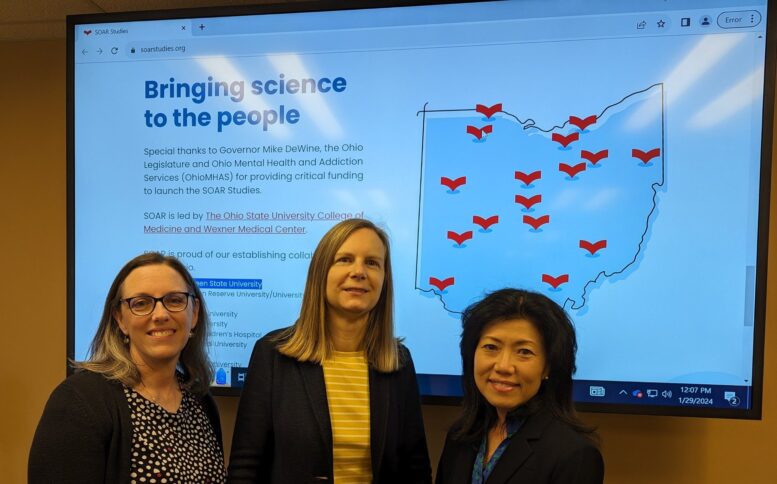From BGSU OFFICE OF MARKETING & BRAND STRATEGY
Bowling Green State University is part of a groundbreaking, collaborative statewide effort to uncover the root causes and risk factors of mental illness in a study that could shape the future health of Ohioans.
The $20 million State of Ohio Adversity and Resilience (SOAR) study is the largest of its kind in the areas of addiction, mental health and resilience research, with BGSU lending its expertise in sociology and family demography.
The SOAR study will examine the biological, psychological and social patterns related to mental health to provide researchers with a playbook for understanding the causes and modifiable risk factors of mental illness, similar to what exists today for heart disease, according to the study’s website.
“BGSU is proud to be part of this groundbreaking initiative and opportunity to affect meaningful change in the health and well-being of Ohioans,” BGSU President Rodney K. Rogers said. “As a public university for the public good, we believe it is our responsibility to drive innovation and research that improves our communities, and we will broaden our impact by working collaboratively with researchers at various public and private universities and with healthcare providers across our state.”
Dr. Susan Brown, a distinguished sociology professor sought worldwide for her expertise, is among the three BGSU researchers contributing to the study led by the Ohio State University College of Medicine and Wexner Medical Center.
Brown is the director of the BGSU Center for Family and Demographic Research (CFDR) and co-director of the National Center for Family and Marriage Research (NCFMR). These two national centers are regarded worldwide for advancing cutting-edge research on family patterns and their linkages with the health and well-being of children and adults. In addition to shaping national research, work at the CFDR and NCFMR informs policy development and programmatic responses, illustrating how the centers contribute to the public good.
For the SOAR study, Brown will work alongside BGSU sociology Professor Dr. Kei Nomaguchi, recognized among the top 2% of researchers worldwide, and Dr. Krista Westrick-Payne, NCFMR assistant director and a leading researcher on the geographic context of marriage, family formation and life transitions.
Nearly a dozen other collaborators, including public and private universities and hospitals across Ohio, are part of the historic project that is bringing together experts from various disciplines to close the gap between understanding and treatment for the state’s mental illness epidemic.
Project partners include the University of Toledo, Case Western Reserve University/University Hospitals, Kent State University, Northeast Ohio Medical University, Nationwide Children’s Hospital, Wright State University, Central State University, Ohio University and the University of Cincinnati.
Over the past decade, Ohio has seen a rise in mental illness, suicide and deaths related to drug overdose, problems exacerbated by the pandemic.
“BGSU is a nationally recognized leader in family dynamics and our expertise will help the larger research team understand how families are intertwined with mental health and well-being,” Brown said. “When you bring together scientists from across disciplines and combine their various perspectives, knowledge and experiences, that’s where you see exciting and novel breakthroughs emerge.
“The SOAR study has the potential to be a landmark study of national significance, and it is a privilege for BGSU to be involved in this effort to pioneer innovative approaches for addressing mental health challenges in Ohio and beyond.”
The study includes a survey assessment of mental health in 15,000 Ohioans across 88 counties called the SOAR Wellness Discovery Survey. Researchers will use data on individuals’ strengths in overcoming adversity to determine the factors they should focus on to develop new treatments.
The SOAR Brain Health Study will examine the biological, psychological and social factors of up to 3,600 Ohioans in 1,200 family groups to further gain an understanding of who handles adversity well, who does not and why.
Brown said BGSU researchers will play a key role in analyzing the SOAR Wellness Discovery Survey data by helping determine connections between social and environmental factors. Later, these could be linked to the brain imaging results.
“We’re trying to understand people’s health in a multidimensional framework and contextualize that in the environment they’re living in,” Brown said. “The next step is understanding how those elements connect to what’s happening physiologically in your brain and body.”
In addition to analysis, the BGSU research team will prepare manuscripts for publication in academic journals to make the case for additional funding to expand the study nationally.
“What we’re doing in Ohio and at BGSU could set the stage for launching an even larger study at a national level, spearheading change across America in the realm of mental health,” Brown said.
Further bolstering support for public health and well-being, BGSU is committed to helping grow the behavioral health workforce as part of a shared $1.7 million grant from the Ohio Department of Higher Education.
BGSU and the University of Toledo will implement a comprehensive plan to address behavioral health workforce needs in the state, focused on education programs, trainings and scholarships.

